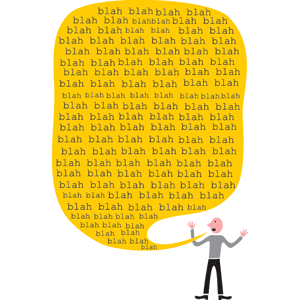Is verbosity rewarded in law school?

Law schools may have a ways to go in teaching first-year students to write, according to a recent study that found longer exam responses tended to receive higher grades than shorter ones, in spite of the fact that judges tend to dislike wordy court filings.
The working paper, “Speed Matters,” found that students who earned a 3.3 grade on a timed essay would likely have boosted it to a 3.4 if the answer included 923 more words, Law.com reports. The paper is authored by Kif Augustine-Adams and James Rashband, who are professors with Brigham Young University’s J. Rueben Clark Law School, and Candace Berrett, who is a BYU statistics professor.
“If you get more words on the page, it’s hard for a professor to say ‘I’m not going to give any extra points for an additional three or four pages,’” Augustine-Adams told Law.com. “We need to think more explicitly about what our exams are doing, what they’re testing for and how we construct our exams.”
The authors were also concerned about the effect of typing speed on exam grades, now that law students take exams on computers. “If the top students are merely the fastest typists, or if a strong correlation exists, it would say something very troubling about the entire first year law school examination enterprise,” the professors wrote. “A law student’s keyboarding skill does not seem relevant to a student’s understanding of course material, analytical ability, or to her future performance as a lawyer. … Fortunately, in the end, there was not statistically significant relationship between typing speed and grades.”
The study did find that essay-based exams rewarded students who could analyze information quickly, and that those with higher undergraduate grades and LSAT scores tended to have better exam grades, regardless of length.
The working paper’s study focused on more than 5,000 first-year exam results from more than 800 BYU Law School students over a six-year period ending in April 2016. Out of that group, 201 took a typing test. The professors did a statistical analysis that focused on grades; the length of an exam response; typing speed; LSAT scores and student demographics. Grades from exams which were not timed were not included in the research.



